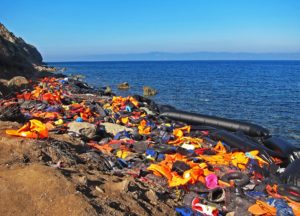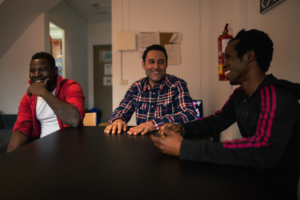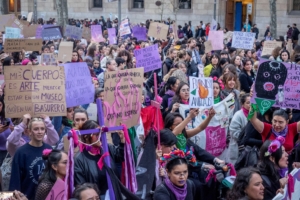La CCAR participa en la formación de formadores del proyecto Integra-Train
12/12/2017

El seminario reunió profesionales del área de acogida y asistencia de refugiados de Bulgaria, Grecia, Italia, Malta y España que debatieron sobre posibilidades de transferencia, adaptación o creación de enfoques y herramientas para proporcionar orientación y apoyo informativo a los beneficiarios de la protección internacional. La formación fue proporcionada por profesionales de Italia y España trabajando en organizaciones de apoyo a refugiados con la tarea de implementar programas de acogida y de integración gubernamentales en ambos países.
Karina Zubiaga y Susanna Nicolas de la CCAR realizaron dos de las sesiones formativas. La primera proporcionó información práctica sobre el programa español de tres fases para la recepción y la integración de los refugiados que implica herramientas de soporte de hasta 18 meses por beneficiario. La segunda sesión presentó herramientas concretas de acción conceptualizadas entorno del trabajo colectivo para apoyar a los refugiados en el proceso de adquisición de lenguas, orientación laboral y ajuste general y adaptación a la sociedad española.

En la discusión final que siguió a las diferentes sesiones, los participantes acordaron que los módulos deberían dirigirse a los trabajadores sociales para apoyar su trabajo con los beneficiarios de la protección internacional y, por tanto, apoyar la mejora de los sistemas de asistencia e integración en los tres estados miembros. Algunos de los temas principales a incluir en los módulos que ha destacado el presentador fueron: orientación cultural, educación cívica, orientación laboral, derechos de las mujeres, salud y papel de la mujer en las sociedades europeas, acceso a la justicia y servicios básicos, incluidas competencias interculturales.

CCAR takes part in the training for trainers of the Integra-Train project
The provision of relevant information and orientation becomes key component in the process of reception and integration of beneficiaries of international protection. This was the topic put at the centre of the training seminar “Facilitating the Integration of Beneficiaries of International Protection by Provision of Orientation and Information”, hosted by the Centre for the Study of Democracy in Sofia between 29 November and 1 December 2017 and at which two representatives of CCAR attended.
The seminar gathered professionals in the refugee reception and support field from Bulgaria, Greece, Italy, Malta and Spain who discussed possibilities to transfer, adapt or invent approaches and tools in the provision of orientation and information support to beneficiaries of international protection. The training was provided by professionals from Italy and Spain working at refugee support organisations with a mandate to implement government run reception and integration programs in the two countries.
Karina Zubiaga and Susanna Nicolas from the Catalan Commission for Refugees (CCAR) conducted two of the training sessions. The first one provided practical information on the three-stage Spanish program for reception and integration of refugees which involves tools for support of up to 18 months per beneficiary. The second session presented concrete action tools conceptualized around group work to support refugees in the process of language acquisition, job orientation and overall adjustment and adaptation to the Spanish society.
In the final discussion that followed the different sessions, participants agreed that the modules should be directed at social workers to suport their work with beneficiaries of international protection and thus support the enhancement of the assistance and integration systems in the three member states. Some of the main topics to be included in the modules stressed by the presenter included: cultural orientation, civic education, job orientation, women’s rights, health and the role of women in European societies, access to justice and basic services including inter-cultural competences.



